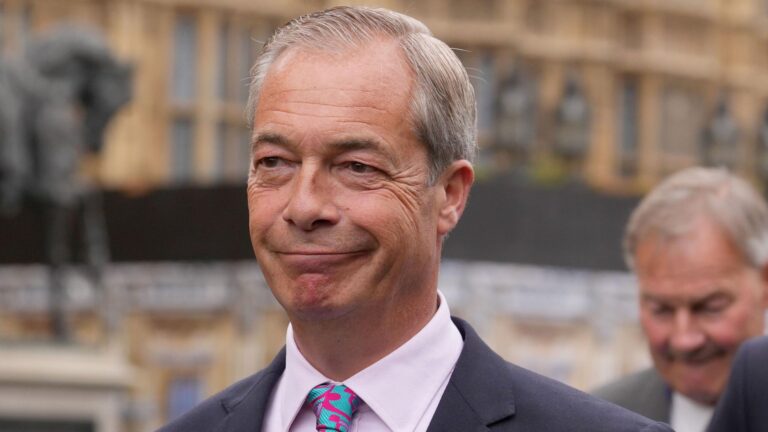Rafael Behr, The Guardian.
Labour’s reluctance to name Brexit as the cause of so many problems hasn’t stopped Reform’s rise. It’s time to try the truth.
So begins another chapter in the liberation struggle. Released from bondage to the EU, Britain finds itself subjugated to a more insidious foe. The border that should have been sealed is wide open. The foreign hordes are still coming, but their passage is no longer directed by bureaucrats from Brussels. This time, national emancipation depends on breaking the tyranny of human rights lawyers.
That is the plot to Nigel Farage’s Brexit sequel, previewed on Tuesday in an airport hangar in Oxfordshire. The Reform UK leader laid out plans for “mass deportation” of migrants – all who arrive without permission, plus those who are here already and came by illicit channels.
Tens of thousands will be targeted. There would be cash incentives for anyone volunteering to leave. Refusers would be rounded up, detained in camps and flown to their countries of origin or, if those places won’t have them, some other place. A remote island, maybe. The exchequer would remunerate receptive governments.
If deportees face the likely prospect of torture or death on arrival, well, that would be unfortunate but not sufficient grounds to stop the flights.
There would be no legal recourse to sanctuary because the UK would withdraw from international treaties and conventions that grant protection to refugees. The European court of human rights would have no say. The universal principles it upholds would be expunged from domestic statute, to be replaced by custom-made British rights. And in that category, there is only one entitlement Farage holds sacred – the freedom of the settled British population to live unmolested by the phantom multitude of foreign criminals posing as refugees.
By calling his plan Operation Restoring Justice, Farage is hinting at future redress for the grievance, much aired in radical rightwing circles online, that police and courts operate “two-tier” policies with a systemic bias in favour of immigrants. The inference is that courts might be used as instruments of nationalist restitution, dismantling liberal multiculturalism, putting native-born Britons first.
This is not an original programme. The last Conservative government passed several laws on the premise that the illegal traffic in boats across the Channel would be deterred by threats of detention and deportation. When it didn’t work, blame fell on European convention rights that prohibit sending people to unsafe places. Ministers legislated again, creating a statutory power for ministers to declare a country safe: Rwanda, specifically, regardless of evidence to the contrary.
A bill to assert the primacy of British rights over European ones has been rattling around Tory policy cupboards for longer still. David Cameron pledged one ahead of the 2010 general election, and again in 2015. A version of it resurfaced under Boris Johnson, and even made it as far as a first reading in parliament in 2022, but no further. The problem each time has been the same. A bill that repudiated international treaties would signal Britain’s withdrawal from the community of reliable democracies, sabotaging diplomatic relations and burning alliances. No responsible prime minister would consider it. Even irresponsible ones have shied at the cost.
That is no impediment to the Reform UK leader. He welcomes objections to his plans on the basis of what a law-abiding government should do because his offer to the electorate is wilful transgression and denial of consequence. When politicians whose methods are deemed to have failed say a plan is reckless, Farage’s audience hears a recommendation. Recklessness sounds like a virtue if it means the status quo is in jeopardy.
The Reform plan doesn’t entirely ignore the logistics of implementation. There is a cost estimate of £10bn over five years, including £2.5bn for the construction of detention centres in as yet undetermined locations. The numbers are fictions, big enough to sound serious but small enough to be easily covered by some bogus revenue source in a future manifesto.
Diplomatic obligations to honour treaties are swept aside with an invocation of national emergency. Public order is imperilled by uncontrolled migration, Farage says. Then he executes a rhetorical pivot from the undesirable character of those arriving by boat – “suspected of being involved in some form of terrorism” – to the prospect of unrest in communities where there is “rising anger” and “despair” at the influx of these marauding interlopers. His warnings are threats. His foreboding fans the flames.
The call to arms is amplified by what used to be called the Tory press, but now treats Farage with deference as prime minister-in-waiting. There is a lot of presumption in that posture when the next general election doesn’t have to be held before summer 2029. Reform UK currently have four MPs, 316 seats short of a working majority.
But not much about Farage’s candidacy fits the conventional template of party politics. By any measure of success except parliamentary representation and ministerial offices held, he is the most significant leader of his generation. No policy action of the 21st century matches Brexit in terms of consequence for Britain, nor even comes close. Boris Johnson can take credit for cajoling a majority to vote leave in 2016. David Cameron earns a place on the podium of shame for blundering into a referendum in the first place. But Farage’s agitation was the key. He set the goal, branded it “independence” and connected it to the high-voltage rail of anti-immigrant feeling.
Whatever else leaving the EU was meant to achieve – autonomy in tariff rates, regulatory sovereignty, bendier bananas – border control was baked in as the test of a proper Brexit. Free movement had to end. That is why Theresa May ruled out single market membership before negotiations in Brussels had even started, and why Keir Starmer keeps it off the table.
That taboo prevents the prime minister properly describing the economic cost of Brexit. It mutes any recognition of all the other dimensions of national self-harm involved in withdrawal from a continental trading bloc at what history will judge to be the worst possible moment to go chasing delusions of free-trading global grandeur.
Starmer is stranded in a strategic cul-de-sac, managing a stagnant economy. He struggles to address the frustration and dismay of a demoralised electorate, while the principal author of their predicament rehearses the remake.
There was a tactical case to avoid making the last general election a relitigation of Brexit. There are reasons still to choose words carefully when commenting on an issue that stirred strong emotions, not to belittle the hopes and expectations of leave voters or conflate their sincerity with the venal cynicism of campaigns that lied about what was on offer.
But are we really going to spend the next four years watching Farage leaf casually through the familiar playbook, running the same campaign to the fawning applause of the same courtier commentariat? Is it too much to expect a Labour government to raise, by way of rebuttal, the Reform leader’s proven failure as an arbiter of the national interest? We tried listening to him. His probity and judgment were sold as the product called Brexit. It turned out to be a piece of shit. Enough people already know this is the truth, but it would be liberating to hear it from the prime minister.


